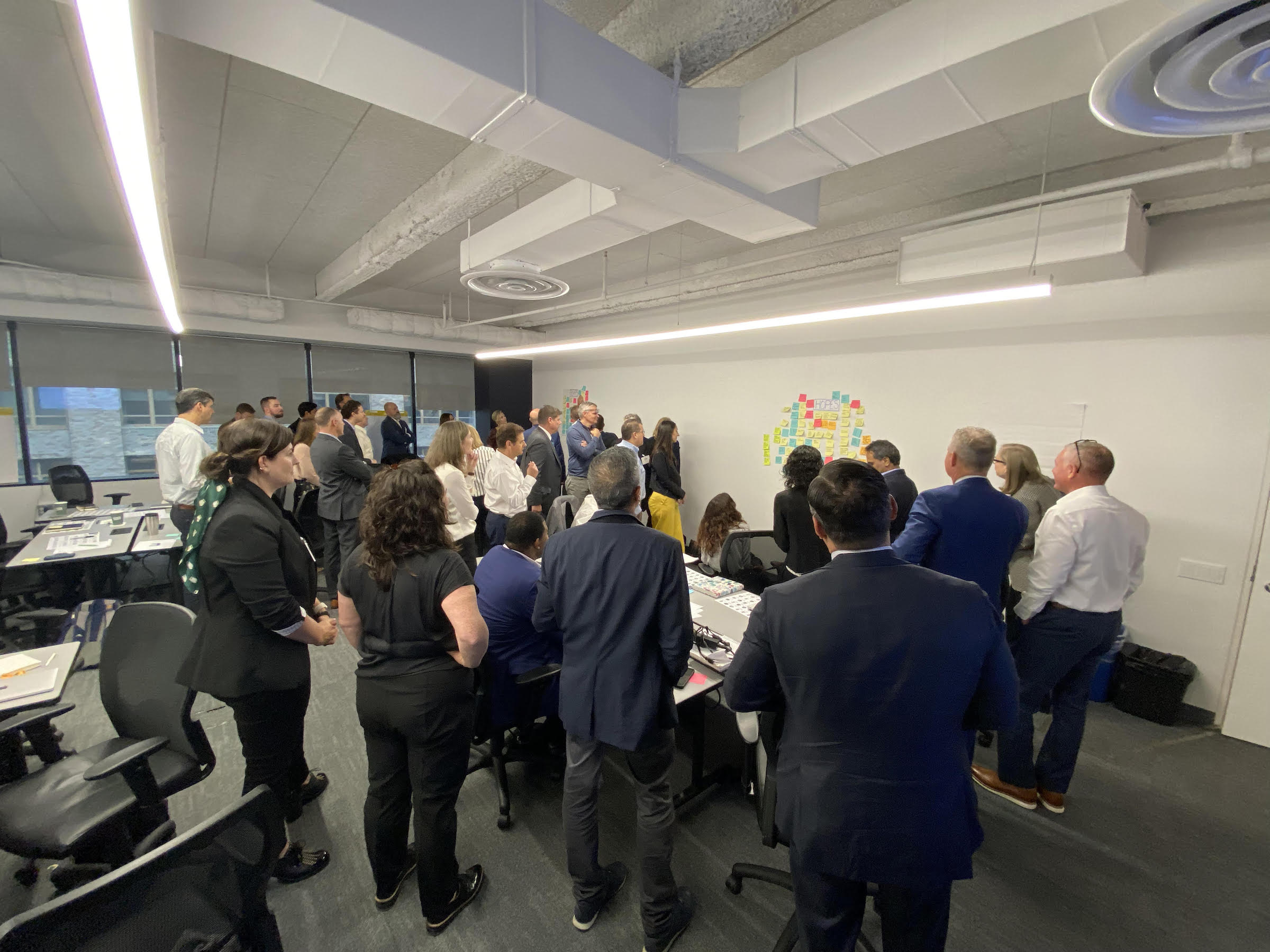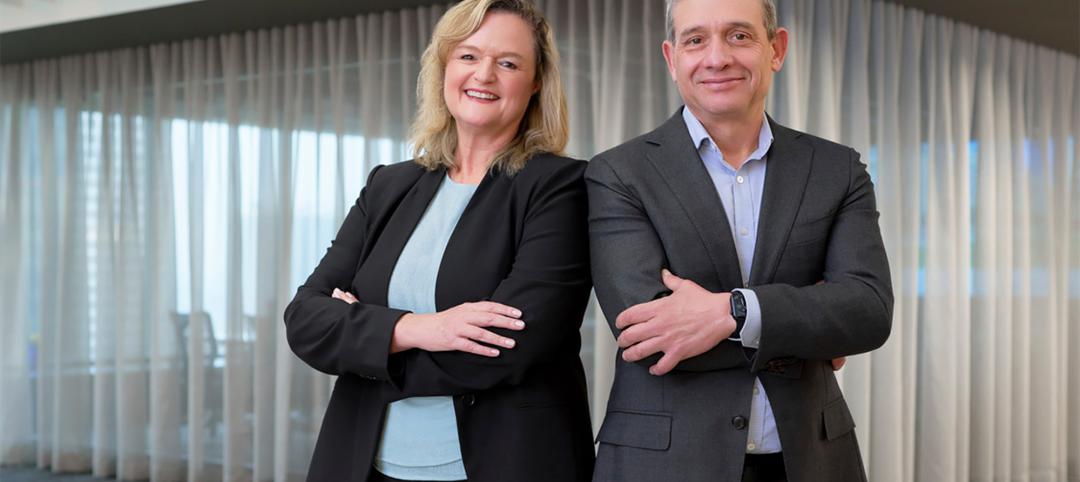The New Canaan Library in Connecticut is scheduled to open this February. The $38.5 million, 42,000-sf library is the first building project in the U.S. for Design for Freedom, a three-year-old movement in partnership with more than 80 construction industry leaders dedicated to identifying and disrupting the use of slave labor in the building materials supply chain.
On the library project, which is positioned as a knowledge and learning center, Design for Freedom collaborated with Centerbrook Architects, Turner Construction, and 21 subcontractors to trace 30 raw and composite building materials as far as possible within the supply chain.
This collaboration is a stepping stone in Turner’s broader sustainability strategy that is informed by environmental, social, and governance (ESG) criteria. In support of that strategy, Turner hosted a one-day ESG Sustainability Summit last November that was facilitated by Deloitte and attended by 45 industry leaders representing 18 companies that included AEC firms FXCollaborative and NBBJ, and suppliers Nucor, Johnson Controls, Hilti, Otis, and Schneider Electric.
Representatives from Design for Freedom presented at the event. Turner’s commitment to that movement is “vertically galvanizing the AEC industry globally,” said Sharon Prince, Founder of Grace Farms Foundation, from which the movement emanated. (Download the Design for Freedom report - PDF) See also BD+C Executive Editor Rob Cassidy's interview with Sharon Prince, DFF Founder, on Horizon TV: "Design for Freedom: Ending Slavery and Child Labor in the Global Building Materials Sector."
ESG is now part of the DNA of a growing number of AEC firms—including Gensler, Thornton Tomasetti, Perkins and Will, Gilbane, Arup, and Jacobs, to single out a prominent few—that have committed their business practices to following principles that promote equity, social justice, and governance. However, the execution of such strategies is easier said than done and politically fraught, especially when it comes to calling out a manufacturer’s or country’s labor practices in the supply chain.
“During Covid, we got a lot smarter about where things were coming from,” recalls Chris McFadden, Turner’s Vice President of Communications and Marketing. “But that led to deeper questions, and we realized that we needed a larger assemblage of people. That’s why we held the summit.”
When established companies like Turner are looking to set up ESG criteria, they usually start by conducting a “materiality assessment” that gauges what’s important for its stakeholders. The summit “was the beginning of a journey,” says Peter Hamill, Senior Vice President at Turner’s Boston office, who is spearheading its sustainability strategy.

While he candidly admits that Turner “doesn’t have the answers yet,” it had a head start internally. For the past five or six years, Hamill has been part of a leadership group of eight or nine employees that sets the company’s ESG standards. Since 1966, Turner has had a Community and Citizenship group in place. What Turner lacked, says Hamill, was an “umbrella” that brought together these various efforts.
The summit was that first step, but it was precipitated a year earlier by a visit from Turner to Grace Farms, an 80-acre cultural and humanitarian center in New Canaan that’s owned by Prince’s nonprofit Grace Farms Foundation. That visit further familiarized Turner with Design for Freedom and its efforts to eliminate forced labor from the production and distribution of building products. Last August, Fast Company recognized Prince was one of its Most Creative People in Business in 2022.
Turner Construction aims to get smaller subcontractors on board
Hamill acknowledges that, for at least 15 years, activist investors have compelled AEC firms like Turner to factor climate change and social justice into their business policies, to the point where companies are now rated on their ESG programs. “‘Impact investing’ has made this a real issue for us,” he says. McFadden adds that Turner’s younger employees and recruits now regularly ask about the firm’s ESG policies. “Gen Z and Y care about this,” says Hamill.
Turner’s influence on the supply chain, as well as such areas as embodied carbon and materials recycling, is typically felt first by what Hamill calls its “Tier 1” subcontractors, none of which, to his knowledge, are using products made from forced labor. Hamill sees greater opportunities to affect Tiers 2 and 3 subs, especially in the raw materials they select, such as their choice of binder for cement to reduce the material’s carbon footprint. “The Holy Grail of ESG is not the giant companies but the moms and pops, and there are thousands of these,” he observes. “So we said, ‘Let’s get our own house in order first.’”
To that end, Turner’s goal is to establish sustainability measures during the first quarter of 2023, and the framework for its ESG program by mid-year 2023, so that the entire company and its 10,800 employees are subscribing to these criteria in all of the firm’s projects by 2025.
Within the year, Turner also plans to release its first standalone ESG report. For a number of years, Turner’s parent company, Hochtief, has been reporting on the subsidiary’s progress. Last fall, Turner also published an 11-page Equity Audit that included a demographic profile of its corporate employees and staff, its goals through 2030 to increase minority and women representation in its workforce, its intent to make hiring in general more diverse, and to expand opportunities for promotion and compensation.
“A lot of what we’re talking about is a process that’s deliberate and accountable, because holding big companies accountable is a good thing,” says Hamill.
Related Stories
Architects | Apr 6, 2023
New tool from Perkins&Will will make public health data more accessible to designers and architects
Called PRECEDE, the dashboard is an open-source tool developed by Perkins&Will that draws on federal data to identify and assess community health priorities within the U.S. by location. The firm was recently awarded a $30,000 ASID Foundation Grant to enhance the tool.
Cladding and Facade Systems | Apr 5, 2023
Façade innovation: University of Stuttgart tests a ‘saturated building skin’ for lessening heat islands
HydroSKIN is a façade made with textiles that stores rainwater and uses it later to cool hot building exteriors. The façade innovation consists of an external, multilayered 3D textile that acts as a water collector and evaporator.
Women in Design+Construction | Apr 5, 2023
Carole Wedge, former Shepley Bulfinch President and CEO, retires after 37 years
Wedge’s 37-year career at Shepley Bulfinch evolved a historic firm into a national design practice.
AEC Innovators | Mar 27, 2023
Leading architecture, engineering firm HED appoints new co-CEOs
As children of immigrant families, Van Herle and Suarez will bring a diverse perspective into a historically underrepresented industry and advance the firm’s mission of creating a positive impact for clients, communities, and the world.
Transportation & Parking Facilities | Mar 23, 2023
Amsterdam debuts underwater bicycle parking facility that can accommodate over 4,000 bikes
In February, Amsterdam saw the opening of a new underwater bicycle parking facility. Located in the heart of the city—next to Amsterdam Central Station and under the river IJ (Amsterdam’s waterfront)—the facility, dubbed IJboulevard, has parking spots for over 4,000 bicycles, freeing up space on the street.
Building Tech | Mar 14, 2023
Reaping the benefits of offsite construction, with ICC's Ryan Colker
Ryan Colker, VP of Innovation at the International Code Council, discusses how municipal regulations and inspections are keeping up with the expansion of off-site manufacturing for commercial construction. Colker speaks with BD+C's John Caulfield.
AEC Innovators | Mar 3, 2023
Meet BD+C's 2023 AEC Innovators
More than ever, AEC firms and their suppliers are wedding innovation with corporate responsibility. How they are addressing climate change usually gets the headlines. But as the following articles in our AEC Innovators package chronicle, companies are attempting to make an impact as well on the integrity of their supply chains, the reduction of construction waste, and answering calls for more affordable housing and homeless shelters. As often as not, these companies are partnering with municipalities and nonprofit interest groups to help guide their production.
Modular Building | Mar 3, 2023
Pallet Shelter is fighting homelessness, one person and modular pod at a time
Everett, Wash.-based Pallet Inc. helped the City of Burlington, Vt., turn a municipal parking lot into an emergency shelter community, complete with 30 modular “sleeping cabins” for the homeless.
Multifamily Housing | Mar 1, 2023
Multifamily construction startup Cassette takes a different approach to modular building
Prefabricated modular design and construction have made notable inroads into such sectors as industrial, residential, hospitality and, more recently, office and healthcare. But Dafna Kaplan thinks that what’s held back the modular building industry from even greater market penetration has been suppliers’ insistence that they do everything: design, manufacture, logistics, land prep, assembly, even onsite construction. Kaplan is CEO and Founder of Cassette, a Los Angeles-based modular building startup.
AEC Innovators | Feb 28, 2023
Meet the 'urban miner' who is rethinking how we deconstruct and reuse buildings
New Horizon Urban Mining, a demolition firm in the Netherlands, has hitched its business model to construction materials recycling. It's plan: deconstruct buildings and infrastructure and sell the building products for reuse in new construction. New Horizon and its Founder Michel Baars have been named 2023 AEC Innovators by Building Design+Construction editors.

















